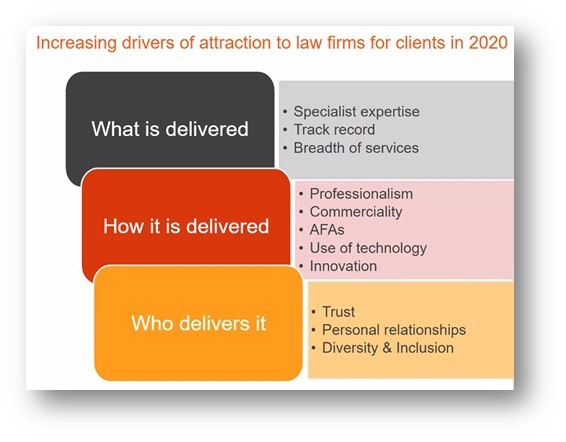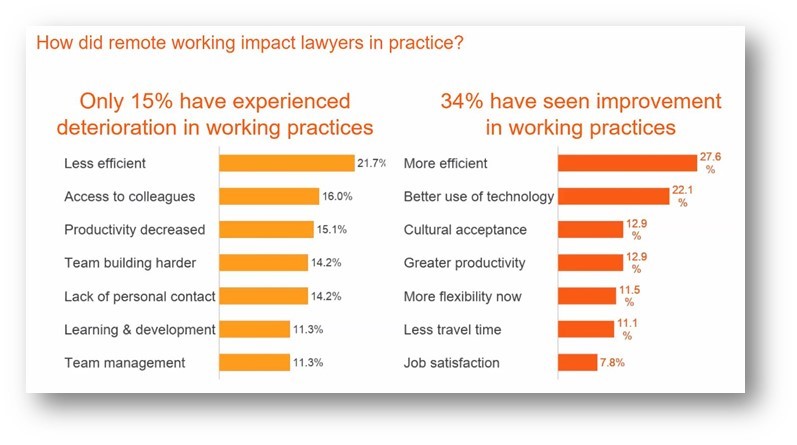Image Credit: REUTERS/Gonzalo Fuentes

In 2020, we experienced “the great equaliser” for the legal industry, combining the good from before with the great from the now.
A recent half-day virtual event, Legal Geek Presents Thomson Reuters Takeover, underscored this idea and offered a glimpse into the latest legal insights on the future of the legal profession and the impact of the opportunities arising in legal technology.
Lizzy Duffy, Senior Director of Global Client Services at Thomson Reuters Acritas, gave a sharp keynote that cut to the heart of the changes we all experienced during the pandemic over the last year. Duffy shared the vision we lived, a sense of humanity, where we peered into each other’s homes, met pets, and universally heard one of our colleagues quip, “You’re on mute!” Raising important lessons from this time, Duffy focused on the positive, examining what we can learn from the last year and how we can push away the unhealthy habits we once had.
Turning toward numbers—since Duffy specialises in data around current legal trends—she noted that one major lesson of the pandemic (and potential benefit) is the renewed focus on doing more with less. Over the last year, the pandemic created a surge in work for law firms and corporations, specifically around contracts and financing. Alas, legal budgets did not grow in tandem, Duffy said. While corporate general counsel experienced an uptick in disputes, for example, the spending did not follow, Duffy said, identifying an imbalance in legal organisations desire to provide more to clients and customers, but doing without any increase in resources. The pinch of the increased need for services coupled with less resources became real in lockdown.
Law firms also have refined their drivers as a result of the pandemic, according to Duffy. The parameters now include, what is delivered, how it is delivered, and who is delivering it. First, law firms have to distinguish themselves with what is delivered, by offering highly specialised, experienced talent, while also increasing their range of services provided. Second, technology and thinking innovatively greatly influenced how it is delivered, and leveraging alternative resources were accelerated. Third, diversity, equity and inclusion became an important standard for all parties as to who is delivering it, while trust and personal relationships—seemingly omnipresent, were even more important in a virtualised environment for clients and law firms.

The struggles highlighted during the keynote demonstrated a divide between virtual and in-person experiences. Acritas found that 15 percent of practitioners experienced an overall deterioration in their perspectives by being less efficient and productive, missing collaboration with colleagues and learning opportunities. Conversely, 34 percent said they felt they were more efficient, enjoyed leveraging technology, and felt more productive.
Duffy noted our human existence of commonalties—yet juxtaposed our differences. In the end, the path forward is a hybrid approach, where law firms and corporations acknowledge these different experiences and adapt to allow individuals the latitude of picking their own Tao-ish professional path towards balance, flexibility, and order.

In the session Now What’s Trending?, Rawia Ashraf, Senior Director of Legal Practice and Productivity, and Jim Leason, Vice President of Customer Proposition, both at Thomson Reuters, led a discussion making sense of the latest trends in legal technology. They dove into a panoply of topics including, working from home, alternative legal service providers, the Cloud, and transaction management.
Ashraf recalled a conversation she had in 2018 about Cloud adoption, where a leader in the industry mentioned that it was going to take a pivotal event to push the legal industry fully into the Cloud, thinking it was going to be a major security breech. It ended up, of course, being COVID-19.
During a participant poll in this panel, Ashraf asking attendees what percentage of law firms were not comfortable with the Cloud, based on the 2020 ILTA Technology Survey. While most respondents thought it was 28 percent, Ashraf informed the audience that it was only 11 percent. Clearly Cloud technology has grown in importance over the last handful of years, and this was greatly accelerated over 2020.
Another issue that Leason and Ashraf tackled surrounded cost. With projected real estate footprints falling, where do the unallocated savings go? Leason believes a good percentage will be invested in technology; and with a multitude of newer applications and services coming into play, it is a natural progression for efficiency and productivity in the marketplace.
Lastly, Legal Geek brought us breakout sessions around artificial intelligence (AI), discussing ethics and contract review, which are strong themes in machine learning. The session highlighted Thomson Reuters’ recently launched AI Principles, a set of guidelines designed to ensure the organisation is promoting the ethical research, development, and adoption of AI. Given the bias that can be found in various algorithms which can be greatly exacerbated by AI, it was comforting to learn the industry is conscious and actively doing something.
The Legal Geek event really brought home that 2020 has been a time to reflect, learn, adapt, and adopt. While we all have commonalities in our goal of serving a client, we may do it differently. Leveraging technology, what we have learned about ourselves, and tapping into our own basic nature will make the path forward easier and better for everyone. That will be especially true if we can embrace the flexibility we have recently enjoyed and combine it with the good of the old, thereby creating a healthier ecosystem that’s well enabled by technology.
For more information on innovative legal technology, please click here.



